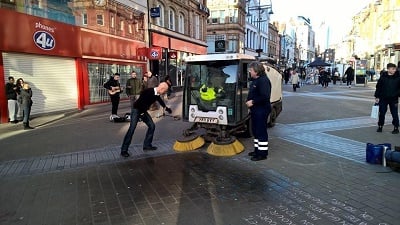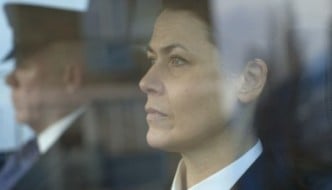Pavement Poet says Leeds City Council Want To Stifle Expression ‘In The Land of Shakespeare’
March 12, 2015

A busy city centre. A man armed with a piece of chalk. A street-sweeper in a fluorescent jacket armed with a jet wash.

No, this isn’t a description of a Saturday night gone wrong. Instead, this is the scene that unfolded when an artist known as The Pavement Poet visited Leeds only a few short weeks ago – and the situation has reignited the long-standing debate about the freedom to create art in public spaces.
The Pavement Poet – aka. Daniel Rowland – does exactly what it says on the tin: Poetry. On pavements. In chalk, to be precise. For me, the idea of drawing on the floor in chalk evokes memories of drawing hopscotch grids on the pavement outside my house as a child but this is clearly not a sentiment shared by Leeds City Council. Within minutes of the artist getting down to work, they arrived on scene and began jet-cleaning the poetry away. No room for nostalgia here, then. Add to this the fact that Daniel was very nearly arrested when the police were called to the scene and the situation takes on a certain melodrama which is hard to believe (although amusingly the only thing that offended the police was the poet’s misspelling of ‘Shakespeare’, which they asked him to correct).
Unsurprisingly, the whole event was captured on camera and posted to The Pavement Poet’s Facebook page within hours. Council officials carry out their work with faces of stone, Daniel becomes increasingly agitated whilst shouting about stifling expression ‘in the land of Shakespeare’ (even if the spelling leaves a little to be desired), and the respectable elderly gentleman shouting ‘Jobsworths!’ at the man in the street-sweeper is really something to behold.
It turns out that Leeds is only the second in the country to have ‘cleaned up’ the chalk poetry from streets in the City Centre. Although his comparisons between Leeds City Council and ‘Nazi Germany’ may be a slight exaggeration, it is perhaps true that the Council’s decision to descend on the scene with such ferocity is fundamentally at odds with the thought behind the artwork. After all, as Daniel points out, his poetry is inoffensive, contains no obscenities and will eventually wash away with the rain (which, let’s face it, we’re not short of in Yorkshire).
So why the big fuss? And who is this man whose chalk words prompted a situation which he calls ‘ridiculous to the extreme’?
Daniel was inspired to start chalking poetry on the streets after a friend of his talked about ‘lighting fire with chalk’ one day. ‘He wasn’t being literal,’ he is quick to point out, ‘but it gave me the idea to write my poetry in chalk.’ Though there is no specific theme running through the poems – he says that he is ‘inspired by all sorts: life, nature, politics, spirituality’ – the inspiration for his poetry springs from ‘the impermanence of human thought’ which, as with the chalk, ‘will ultimately vanish to be replaced by a new thought.’

In the video diary on his Facebook page, Daniel asserts that it is the Business Charter (which stipulates that ‘mess has to be cleaned up within an hour’) which appears to be behind the Council’s actions. He maintains that the reaction to his work is an example of ‘business coming before culture’ – and in light of the current cultural climate of decreasing funding and increasing educational focus upon core subjects perhaps he has a point. It’s clear that, in ‘official’ eyes at least, the line between ‘art’ and ‘vandalism’ becomes blurred when artists make use of public space in this way.
If art created in a public space – permanent or impermanent – is deemed to be ‘mess’, does that give anyone else the right to clean it up? Is chalk poetry considered the same as ‘graffiti’, perhaps? ‘I see myself as doing something very different,’ Daniel says. ‘Graffiti artists typically use paint. And it is as much a style as anything. I use chalk and write on paving slabs, which if anything is the original canvas. People were scratching things into stone thousands of years ago. The only difference here is I use washable chalk.’
The distinction is clearly one that he feels passionate about. ‘If I wanted to be an arsehole,’ he declares in one of his videos, ‘I’d do what Banksy does and use spray paint’, thus making his work permanent and therefore more of a nuisance than using chalk. Though I don’t feel qualified to comment on whether or not Banksy is indeed ‘an arsehole’, this does raise the obvious question: if Banksy is considered an ‘artist’ but a spray-paint tag is considered ‘vandalism’, where does chalk poetry sit on this spectrum? After all, if a plucky young Council official armed with a tin of emulsion had covered up Banksy’s work when it first appeared, the face of graffiti-art might be very different today.

One thing is certain: The Pavement Poet’s work has certainly opened up a dialogue between artist and audience. As Daniel says, his poetry is intended to ‘reflect, inform, commentate and observe the world around us, and to communicate these things to people through the poetic medium’, and a quick look at the Pavement Poet’s Facebook page reveals an overwhelming support for the artist. In fact, Daniel notes that the only bad reactions to his work have been from ‘over-zealous town or city councils’. It is perhaps understandable, then, that when asked about a possible return to Leeds, Daniel is vague, saying only ‘I’ll likely be back in Leeds again at some point, but how and when remains to be seen’. Although he is positive about the city as a whole – the architecture is, he notes, ‘amazing’ – he also laments the fact that the good residents of the city are being ‘overruled by corporations’ who are dictating what belongs and does not belong in the city centre. Somewhere in between chalking the streets of the country, Daniel is even planning to stand for a parliamentary seat in South Swindon as an independent candidate – although, he notes, ‘I prefer to keep such things as elections separate from my poetry’.
Although the Council eventually retreated and left Daniel to continue with his work, situations like this do highlight the need for an ongoing discussion about the role of art in modern society. Is art only ‘art’ if it’s in a gallery, or if it receives notoriety at a certain level? This seems far too narrow minded to me. Although it’s true that no art can please everybody, it’ll be a sad day when a man in a fluorescent jacket can dictate what is deemed ‘fitting’ art for public spaces.
Keep up to date with The Pavement Poet via his Facebook page. Daniel will also be publishing a book of his poems in the near future – watch this space.




Comments